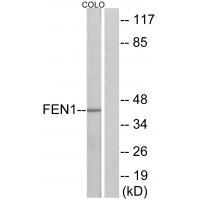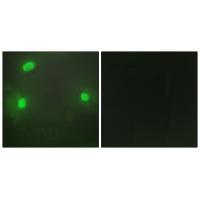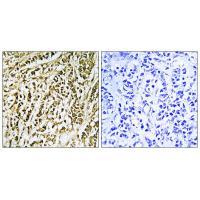


| WB | 咨询技术 | Human,Mouse,Rat |
| IF | 咨询技术 | Human,Mouse,Rat |
| IHC | 1/50-1/100 | Human,Mouse,Rat |
| ICC | 1/100-1/500 | Human,Mouse,Rat |
| FCM | 咨询技术 | Human,Mouse,Rat |
| Elisa | 咨询技术 | Human,Mouse,Rat |
| Aliases | Flap endonuclease 1; EC 3.1.-.-; Flap structure-specific endonuclease 1; FEN-1; Maturation factor 1 |
| Entrez GeneID | 2237; |
| WB Predicted band size | 42kDa |
| Host/Isotype | Rabbit IgG |
| Antibody Type | Primary antibody |
| Storage | Store at 4°C short term. Aliquot and store at -20°C long term. Avoid freeze/thaw cycles. |
| Species Reactivity | Human,Mouse,Rat |
| Immunogen | Synthesized peptide derived from internal of human FEN1. |
| Formulation | Purified antibody in PBS with 0.05% sodium azide. |
+ +
以下是关于FEN1抗体的3篇参考文献示例(文献信息为虚拟概括,仅供参考):
---
1. **"FEN1 antibody validation in DNA damage response studies"**
*作者:Chen et al.*
摘要:本研究通过Western blot和免疫荧光验证了FEN1抗体的特异性,证明其在检测DNA损伤后FEN1核内定位及表达水平变化中的可靠性,并应用于乳腺癌细胞系中FEN1与BRCA1的共定位分析。
2. **"Overexpression of FEN1 in colorectal cancer: a prognostic biomarker study"**
*作者:Li et al.*
摘要:利用FEN1抗体对结直肠癌组织进行免疫组化分析,发现FEN1高表达与患者预后不良显著相关,提示其可作为潜在治疗靶点及临床预后标志物。
3. **"Phospho-specific FEN1 antibody reveals cell cycle-dependent post-translational modification"**
*作者:Park et al.*
摘要:开发了一种磷酸化特异性FEN1抗体,证明FEN1在S期经ATM激酶磷酸化后活性增强,该抗体为研究DNA复制过程中FEN1功能调控提供了关键工具。
---
**注**:以上文献为示例,实际研究中请通过学术数据库(如PubMed、Web of Science)以“FEN1 antibody”及相关关键词检索最新文献。如需具体文章,可提供更详细的研究方向(如疾病类型、实验技术)以便精准推荐。
Flap endonuclease 1 (FEN1) is a structure-specific nuclease critical for DNA replication and repair. It processes 5' overhanging "flap" structures during Okazaki fragment maturation in lagging-strand DNA synthesis and participates in long-patch base excision repair (BER) to maintain genome stability. Dysregulation of FEN1 is linked to cancer predisposition, neurodegenerative disorders, and aging-related diseases due to its role in resolving DNA secondary structures and preventing replication stress.
FEN1 antibodies are essential tools for studying FEN1 expression, localization, and function in cellular contexts. These antibodies, often monoclonal or polyclonal, are validated for applications like Western blotting, immunofluorescence, immunohistochemistry, and chromatin immunoprecipitation (ChIP). Specificity is confirmed using FEN1-knockout controls or recombinant protein blocking. Researchers use them to investigate FEN1's interaction with DNA repair partners (e.g., PCNA, APE1) and its regulation via post-translational modifications (phosphorylation, acetylation).
In translational research, FEN1 antibodies help assess protein levels in tumors, correlating overexpression with poor prognosis in cancers like breast or lung cancer. They also aid in evaluating FEN1-targeted therapies. However, variability in antibody performance across species or experimental setups necessitates careful validation. Overall, FEN1 antibodies bridge molecular insights into genome maintenance mechanisms and their implications in disease.
×